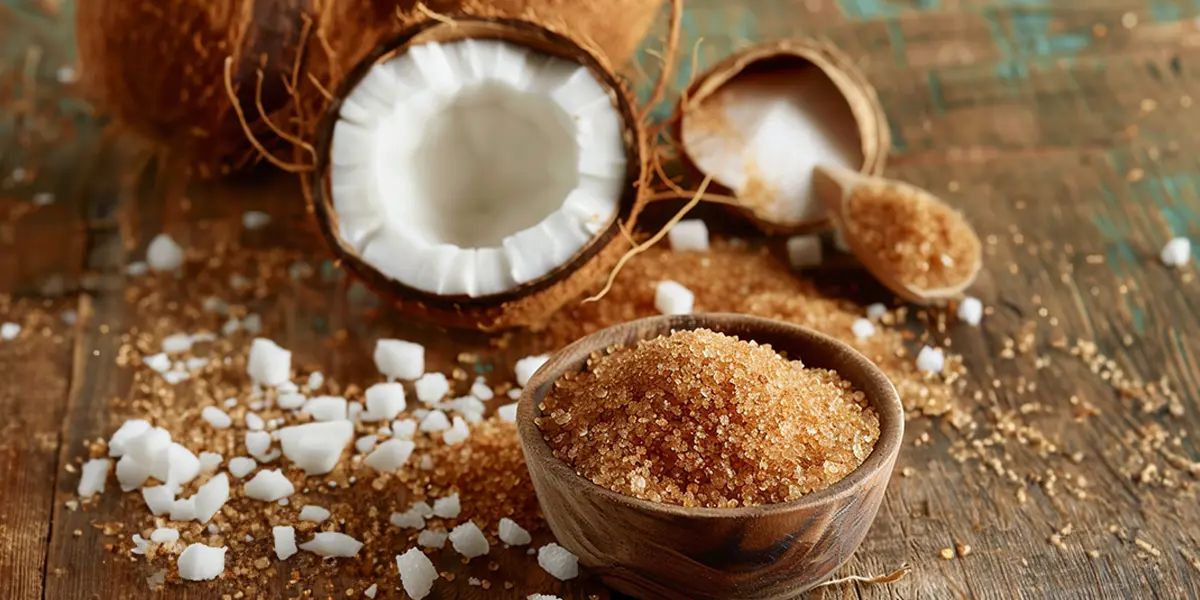Is Coconut Sugar Good for Diabetes?

We all know what coconut is, and of course, we’re familiar with sugar. We’ve also heard about artificial sweeteners and natural sugars to some extent. But did you know there’s something called coconut sugar?
No, it’s not about mixing coconut slices with table sugar and calling it coconut sugar! 😄 Coconut sugar is a natural sweetener made from the sap of the coconut tree, and it’s often considered a healthier alternative to regular sugar. But the big question is, is it good for diabetes? Let’s learn more about it.
At Fitterfly, our Nutrition Coaches recommend that people with well-controlled HbA1c and blood sugar levels consume coconut sugar in small amounts. However, it’s better to avoid it altogether.
Instead, stevia powder, a calorie-free sweetener, is a healthier choice for adding sweetness to food while keeping blood sugar levels in check.
What is Coconut Sugar?
Coconut sugar is a natural sweetener made from the sap of the coconut palm tree. The Sap is the sweet liquid that flows inside the coconut tree, much like the tree’s “juice.”
Sap is collected and heated to remove water, turning it into crystals. It is rich brown in colour and mildly caramel-like in taste. People use it as a natural alternative to white sugar in cooking and baking, and it even contains small amounts of nutrients like iron, zinc, and potassium.
Note:
|
What is the Nutritional Value of Coconut Sugar?
According to research, coconut sugar is not only a natural sweetener but also offers several nutrients that are beneficial for health. One hundred grams of coconut sugar contain essential minerals, fiber, and other bioactive compounds, making it a better alternative to refined sugars.
| Nutrient | Nutritional Value (per 100 gm) |
| Calories | 375 – 400 kcal |
| Carbohydrate | 92 – 95 gm |
| Total Fat | 1 gm |
| Total sugar | 92 gm |
| Dietary fiber | 3 gm |
| Potassium | 1 gm |
| Sodium | 568 mg |
Besides these key nutrients, coconut sugar contains various essential amino acids, supporting muscle health and overall body function. It is rich in vitamins such as vitamins C and E, which have antioxidant properties and promote immune function.
The sugar also contains minerals like zinc, iron, and phosphorus, which are essential for bone health, immune support, and oxygen transport in the body.
To know your chances of Diabetes reversal, take the Diabetes Reversal TestDiabetes Reversal
Calculator
What is the Glycemic Index of Coconut Sugar?
The glycemic index (GI) of food is crucial for diabetes. The GI measures how quickly a food raises blood sugar levels after consumption. Regular sugar has a high GI, meaning it spikes blood sugar rapidly.
Coconut sugar has a GI of around 35, which is considered low. This suggests that it may have a gentler effect on blood sugar levels than regular sugar, making it a better option for some people with diabetes.
However, while its GI is lower, it’s not zero, so consuming it in moderation is still important.
| Note: Even with its low glycemic index, it’s important to remember that coconut sugar is still sugar. For people with diabetes, any form of sugar can affect blood sugar levels. So, while the GI of coconut sugar is lower, moderation and portion control are key to managing your health effectively, and it is still not recommended for people with diabetes. |
Is Coconut Sugar Good for Diabetes?
Research shows that coconut sugar could be a safer alternative to regular sugar for those with diabetes, but with some caveats. The lower glycemic index might cause a slower rise in blood sugar, which is beneficial in managing diabetes. However, it’s still sugar, and monitoring your blood sugar levels and portion sizes is important.
Insulin (a type of fiber) in coconut sugar is another positive factor. Inulin may help slow down the absorption of glucose, thus preventing sharp spikes in blood sugar. But remember that the benefits aren’t as significant as other dietary changes or medications recommended for diabetes management.
What are the Health Benefits of Coconut Sugar?
- Rich in Antioxidants: Coconut sugar is packed with antioxidants, which help protect your body from damage caused by harmful molecules called free radicals. This can help keep you healthier overall.
- Lower Glycemic Index (GI): Coconut sugar has a GI between 35, which means it has a slower effect on blood sugar levels than regular sugar. This makes it a better option for people managing their blood sugar or trying to reduce the risk of diabetes.
- Contains Important Nutrients: Coconut sugar isn’t just sweet—it also contains vitamins like C, E, and several B vitamins, plus minerals like zinc, potassium, and iron. These nutrients help with everything from immune health to keeping your skin and muscles in good shape.
- Good for Gut Health: Coconut sugar contains inulin, a type of fiber that helps feed the good bacteria in your gut. This can improve your digestion and support overall gut health.
- A Natural Sweetener: Coconut sugar is a type natural sweetener for satisfying your sweet tooth. It’s as sweet as regular sugar but with better nutrition.
- Helps Maintain Energy: The potassium in coconut sugar helps balance fluids, supports healthy muscle function, and regulates blood pressure.
What are the Potential Health Risks of Consuming Coconut Sugar?
While coconut sugar may have some nutritional benefits, there are potential risks to consider:
- High-Calorie Count: Coconut sugar is calorie-dense and may lead to weight gain if consumed in excess amounts, which is especially concerning for people with diabetes.
- Contains Sucrose: While it has a lower glycemic index, coconut sugar still contains a significant amount of sucrose, which can spike blood sugar levels. Regular monitoring is essential for people with diabetes.
- Risk of Adulteration: Coconut sugar is sometimes mixed with cheaper sugars, which can impact its quality and nutritional value. Always choose a trusted brand to ensure purity. And yes, remember to read the label; it will tell you more about the product that you are going to buy.
- Digestive Concerns: Like other sweeteners, coconut sugar’s fiber content may cause bloating or gas when consumed in large amounts.
Reduced HbA1c by HALF in 6 months


6.6%
Happy members
EMI
Guarantee
4.8/5
Diabetes Prime Program
How Can Coconut Sugar Help in Diabetes Management and Prevention?
For someone with diabetes, coconut sugar can be a better alternative to regular table sugar, but it’s not a perfect solution. Using it in small amounts instead of refined sugar might help in managing sudden blood sugar spikes. It’s a good option for recipes where you’d usually add regular sugar. That said, it’s still important to watch your overall carbohydrate intake and not go overboard with it.
Coconut sugar can be part of a healthy, diabetes-friendly diet, but it should work alongside essential practices like monitoring blood sugar, staying active, modifying your regular lifestyle, and, more importantly, following your doctor’s recommendations.
4 Tips for Using Coconut Sugar in Diabetes
- Use it sparingly: Even though it has a lower glycemic index, it’s still sugar. Stick to small amounts to keep your blood sugar levels stable.
- Check the label: Make sure the coconut sugar you buy is 100% pure and free from unnecessary additives.
- Substitute carefully: You can replace regular sugar with coconut sugar in your favourite recipes. Since coconut sugar is sweeter than regular sugar, start by using less than the recipe suggests.
- Pair with fiber: Coconut sugar may be better for blood sugar levels when combined with high-fibre foods that slow the absorption of sugar.
How We At Fitterfly Can Help You?
Coconut sugar has become a popular natural alternative to regular sugar, especially for people looking for healthier options. At Fitterfly, we believe in making smart and sustainable choices for managing diabetes. While coconut sugar has a low glycemic index and some nutrients like potassium and inulin, it’s still sugar.
That’s why our Nutrition Coaches recommend having it in very small amounts only if your HbA1c and blood sugar levels are well-controlled. But for most people, it’s better to avoid it altogether.
Instead, we suggest using stevia powder – a natural, zero-calorie sweetener that’s safe and doesn’t cause blood sugar spikes. Our personalised meal plans include practical tips like this to make your daily eating habits healthier and easier to follow.
Along with support from our Fitness and Success Coaches, we help you take small, practical steps toward managing diabetes and improving your lifestyle.
Want to know more about how we can help? Call us at 08068507599 and take the first step toward better health today!
This blog provides general information for educational and informational purposes only and shouldn't be seen as professional advice.
Frequently Asked Questions
Can people with diabetes eat coconut sugar?
People with well-controlled HbA1c and blood sugar levels may consume coconut sugar in small amounts. However, it is generally better to avoid it altogether to maintain optimal blood sugar management.
Which sugar has the lowest glycemic response?
Stevia, monk fruit, and allulose are considered to have the lowest glycemic responses compared to regular sugar and coconut sugar.
Is coconut sugar healthier than sugar?
Coconut sugar is slightly better than refined sugar because it contains trace amounts of vitamins and minerals and has a lower glycemic index. However, it is still sugar and should be consumed carefully.
Is coconut sugar low glycemic?
Yes, coconut sugar has a low glycemic index of around 35, much lower than regular sugar.
Which nutrient in coconut sugar is good for diabetes?
The inulin content in coconut sugar may help slow glucose absorption, potentially benefiting blood sugar control.
Which is better, coconut sugar or jaggery?
Both coconut sugar and jaggery have some nutritional benefits and a lower glycemic index than refined sugar, but jaggery may have slightly more minerals. However, both should be used carefully, in moderation, and under the guidance of a dietitian for people with diabetes.




















